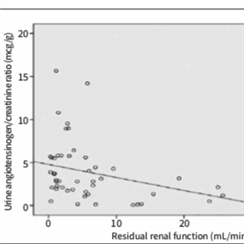Objective: Several studies have shown that local renin–angiotensin system (RAS) activity in the kidneys may play a role in the pathogenesis of hypertension and kidney damage in patients with chronic kidney disease. In this study, we aimed to investigate the effect of local RAS activity on hypertension and residual renal function (RRF) in patients undergoing peritoneal dialysis (PD).
Materials and Methods: Fifty patients with residual urine undergoing PD were included in the study. They were divided into the hypertensive (n=30) and non-hypertensive (n=20) groups. The urine angiotensinogen-to-creatinine ratio, which is an indicator of local RAS activity, was compared between the two groups. Factors affecting this ratio were also investigated.
Results: There was no significant difference in the mean urine angiotensinogen-to-creatinine ratios between the two groups. A correlation analysis revealed that the urine angiotensinogen-to-creatinine ratio had a significant negative correlation with RRF determined by 24-hour creatinine excretion (r=−0.391, p=0.005). There was a positive correlation between the urine angiotensinogen-to-creatinine ratio with proteinuria (r=0.289, p=0.04) and negative correlation with serum albumin (r=−0.280, p=0.049). However, we could not find any association between the urine angiotensinogen-to-creatinine ratio and blood pressure values.
Conclusion: Local RAS activation in the kidney reflected by urinary angiotensinogen is associated with RRF and proteinuria in patients undergoing PD; however, high blood pressure was not correlated with urinary angiotensinogen levels.

.png)

.png)

.png)

